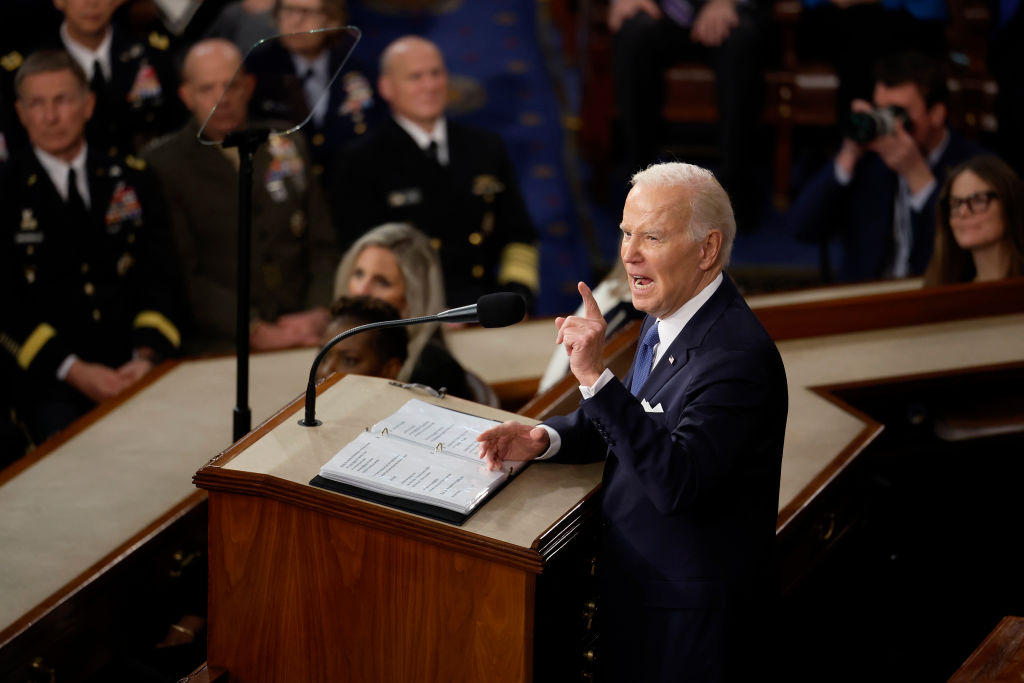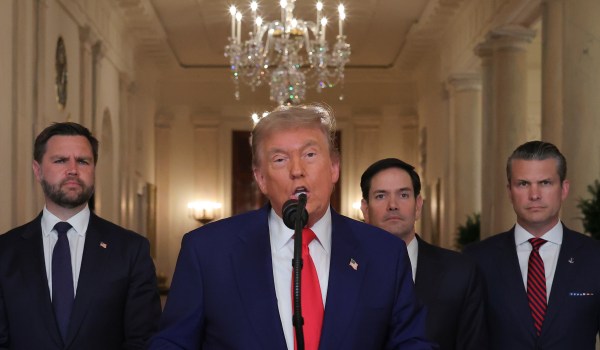Happy Wednesday! Due to this newsletter’s overt Chicago sports bias, we will not be acknowledging LeBron James becoming the NBA’s all-time leading scorer last night, as the development could theoretically detract from Michael Jordan’s G.O.A.T. status.
This is us not acknowledging how cool a moment it wasn’t.
Quick Hits: Today’s Top Stories
- Turkish President Recep Tayyip Erdoğan declared a three-month state of emergency on Tuesday in the 10 provinces hit hardest by the series of earthquakes that struck the southern part of the country Monday. More than 11,000 people have been confirmed dead in Turkey and Syria since the 7.8- and 7.5-magnitude quakes rattled the region, and the death toll is expected to continue rising as officials continue their rescue efforts. Erdoğan’s emergency declaration will allow the government to temporarily bypass parliament to enact new laws.
- The U.S. Strategic Command notified Congress last month that the number of Intercontinental Ballistic Missile launchers in China now exceeds the number of such launchers in the United States. But the U.S. still has more land-based missiles—and nuclear warheads to arm them—than China has.
- Germany, Denmark, and the Netherlands announced Tuesday they will jointly supply Ukraine with at least 100–and up to 178–Leopard 1 tanks, the 1970s predecessor to the Leopard 2 tanks promised last month after much debate. The first tanks should arrive in Ukraine by summer, with the vast majority arriving early next year.
- In an appearance at the Economic Club of Washington on Tuesday, Federal Reserve Chair Jerome Powell indicated the central bank is likely not done raising target interest rates after January’s employment report showed significant job growth beyond economists’ expectations. “I think there has been an expectation that [inflation] will go away quickly and painlessly and I don’t think that’s at all guaranteed,” Powell said. “The base case, for me, is that it will take some time. And we will have to do more rate increases and then we’ll have to look around and see whether we’ve done enough.”
- In a move first reported by Daily Faceoff, a hockey news site, U.S. Labor Secretary Marty Walsh is leaving the Biden administration after the State of the Union address to become the executive director of the National Hockey League’s Players Association. An outspoken advocate for labor unions, Walsh will be one of the first cabinet officials to leave the Biden administration.
- The U.S. Navy released the first photos on Tuesday of the Chinese spy balloon that American military officials shot down over the Atlantic Ocean on Saturday off the South Carolina coast. U.S. intelligence officials have reportedly connected the surveillance balloon to a reconnaissance operation run by the People’s Liberation Army’s air force and have started sharing the intelligence with American allies who have reported being the target of similar military facility-related espionage efforts by Beijing in recent years, the Washington Post reported Tuesday.
The President’s 2024 Pitch

Sure, the State of the Union address could—and probably should—be an email, but if it were, President Joe Biden wouldn’t have had the chance to negotiate policy consensus live on air last night.
The Republican conference happily ignored Speaker Kevin McCarthy’s request that members not yell during last night’s speech—he hushed them more than once from his perch on the House Rostrum—but the party’s more attention-seeking members really blew up when Biden accused the GOP of threatening to force entitlement sunsets in exchange for raising the debt ceiling. McCarthy mouthed that the barb wasn’t true, while Rep. Marjorie Taylor Greene shouted “Liar!” amid general protest.
Biden pivoted. “Ok, we all agree then,” he said, temporarily ditching the carefully crafted script his aides had loaded into a teleprompter. “Messing with Medicare and Social Security to address the debt is off the table.”
In general, the best a president can hope for from a State of the Union (SOTU) address is to get in, tick through some achievements and make some promises, and get out without any embarrassing gaffes. Biden managed that just fine last night, exceeding his opponents’ relatively low expectations for him while happily mixing it up with House Republicans and using his primetime bully pulpit to lay out an economics-heavy account of his track record and goals. The GOP also took advantage of the annual opportunity to send political junkies a message, laying out an alternative vision for the country that highlighted the party’s commitment to fighting culture war battles.
Biden technically can’t campaign from the SOTU podium, but that doesn’t mean he didn’t have his eye on winning over skeptical voters—including those of his own party. A recent Washington Post-ABC News poll showed 58 percent of Democrats and Democratic-leaners want someone other than Biden to run for president, while more than six in 10 Americans don’t think the president has accomplished much during his first two years in office. The SOTU—and the planned post-speech blitz by administration officials—aimed to convince them otherwise.
To make that reelection case, Biden led with the economy—something we wouldn’t have predicted in, say, June when annual inflation topped 9 percent. But with prices starting to stabilize ever so slightly and unemployment at a near-record low of 3.4 percent, Biden felt comfortable touting his economic track record. He highlighted the bipartisan infrastructure law, celebrating bridge and road updates and lead pipe replacements—and taking a dig at Republicans who voted against the bill but still want its funding for their districts. The speech also highlighted Biden’s protectionist leanings, as he celebrated current efforts to boost microchip manufacturing in the United States and promised federal infrastructure projects will only use materials made in America.
His promises for the next two years included both implementation of already-passed legislation and a wishlist for more initiatives. Biden celebrated an insulin price cap of $35 a month for Medicare patients, then urged the price cap’s expansion to all Americans. Biden also nodded to deficit reduction, but his big ideas for accomplishing that goal—raising taxes on the wealthy and big businesses—are unlikely to make it through the current Congress. The “Junk Fee Prevention Act” he boosted could stand a slightly better chance. It would require businesses like hotels, airlines, and ticket sellers—such as Ticketmaster, in proof of Swiftie supremacy—to show their fees up front.
Compared to the economy, everything else got short shrift in Biden’s speech, but he did quickly hit a string of other topics. Acknowledging the presence in the audience of Brandon Tsay, who disarmed the Monterey Park gunman, and RowVaughn and Rodney Wells, parents of Tyre Nichols, who died after being beaten by Memphis police, Biden called on lawmakers to pass both bipartisan police reform and a ban on assault weapons (neither is likely to go anywhere). He also urged congressional codification of abortion access, government-funded universal preschool, and improved mental health care for veterans and young people. Border security also got a shoutout: Biden both urged Congress to create paths to citizenship for DREAMers and other groups and asked for more funding to improve detection and prevention of fentanyl crossing the border. This topic elicited some more heckling from Republicans, who shouted to Biden that fentanyl overdoses are “your fault” and called for more border security.
Biden eased off the apocalyptic rhetoric he’s sometimes used about Republicans—no mention of “ultra MAGA” last night—but Republican responses didn’t return the favor, and they leaned in to culture war-style topics. “Most Americans simply want to live their lives in freedom and peace,” said newly minted Arkansas Gov. Sarah Huckabee Sanders, who had the often politically damaging honor of delivering the official rebuttal. “But we are under attack in a left-wing culture war we didn’t start and never wanted to fight.” Along with stories about her time as former President Donald Trump’s press secretary, fighting cancer, and her work so far in office, she highlighted Biden’s age and argued he’s failed to address high migration at the southern border and foreign policy challenges in Ukraine, China, and North Korea. Trump also released a brief, pre-taped response, blasting the Biden administration for inflation, murder rates, and attempts to “indoctrinate and mutilate our children.”
Biden’s speech was never going to win over die-hard Republican opponents, but his cheerful demeanor as he parried Republican booing—combined with the all-important midterms evidence that his leadership isn’t a death knell for Democratic success—apparently affirmed Democratic leaders’ decisions to line up behind his reelection effort. Former Speaker Nancy Pelosi dismissed suggestions of primary challengers for Biden, telling CNN, “He has a record unmatched by any recent president.” Now all that’s left is convincing voters.
Worth Your Time
- As war wages in Ukraine, Russia is looking to another frontier to exert its influence: Africa. “In Europe, Vladimir Putin’s invasion of Ukraine has been a humiliating and costly disaster for the Russian state,” David Pilling and Andres Schipani report for the Financial Times. “But in Africa, Russia has been making dramatic inroads. Even in the year since Russian troops poured into Ukraine, Moscow has notched up further successes on the continent. Helped by a volatile mix of jihadist terror, anti-French sentiment and coups d’état, it has succeeded in challenging western influence and establishing what a senior adviser to Emmanuel Macron calls ‘a second front’ in Africa.” This is particularly true in the Central African Republic: “Russia’s presence in the country includes some 1,500 masked paramilitaries from the now infamous Wagner Group, gold and diamond operations, and even a small distillery producing 15 cent sachets of Wa Na Wa vodka with the logo of a rhino and the tagline: ‘Made in the Central African Republic with Russian technology.’”
- It’s tempting for many to view any instance of police brutality against a black person through a racial lens, but as the killing of Tyre Nichols demonstrated, that’s not always the most useful framing. “The point is not that we don’t have a grievous problem, but rather that the problem is not exclusively racist white cops. It’s cops, period,” John McWhorter argues in the New York Times. “Because casual and sometimes lethal violence against Black people by cops is part of our shameful and still recent national narrative, names like those of the victims I cited earlier sometimes become national news stories. But the media rarely even covers police killings of white people, which don’t fit so neatly into that pre-existing narrative. So we largely missed the story that in 2015 in Paradise, Calif., the white officer Patrick Feaster shot the white Andrew Thomas as he was getting out of the S.U.V. he had crashed during a pursuit, even as Thomas’s wife lay gravely injured on the ground at the scene. The parallel with what happened to Nichols is ghastly, as is that between George Floyd’s murder and what happened in 2016 to the white Tony Timpa in Dallas. Although Timpa had requested police officers’ help because he was off his medication, he was killed when they pinned him to the ground as he called out desperately. It was recorded on the officers’ body cams. Members of Timpa’s family have contacted me wondering why the media had so little interest in what happened to him; meanwhile, last year, the officer who had pinned him was promoted.”
- In an article that reads more like a Saturday Night Live sketch than a piece of international news, Matthew Gault reports for VICE on the dissatisfaction of some former Taliban fighters now working office jobs in the new government in Kabul. “Huzaifa, a former sniper, said life was simple and free during jihad,” Gault writes. “‘All we had to deal with was making plans for ta’aruz [attacks] against the enemy and for retreating,’ he said. ‘People didn’t expect much from us, and we had little responsibility towards them, whereas now if someone is hungry, he deems us directly responsible for that…the Taliban used to be free of restrictions, but now we sit in one place, behind a desk and a computer 24 hours a day, seven days a week. Life’s become so wearisome; you do the same things every day. Being away from the family has only doubled the problem.’”
Presented Without Comment
Also Presented Without Comment
Toeing the Company Line
- Does the State of the Union have a single redeeming quality? Was the Chinese spy balloon a bigger security threat than, say, TikTok? Why are White House officials shivving Vice President Kamala Harris in the New York Times? And are Trump’s attacks on Ron DeSantis a sign of weakness? Jonah, Kevin, and Declan discussed all that and more on last night’s edition of Dispatch Live (🔒). Members who missed the conversation can catch a rerun—either video or audio-only—by clicking here.
- In Tuesday’s Uphill, Haley takes a look at the burgeoning bipartisanship popping up on the new House Select Committee on China. “A consensus has emerged in Congress that the U.S. needs to take a tougher stance against the Chinese government’s growing aggression at home and abroad,” she writes. “The question is whether other divisions in the 118th Congress will undermine the bipartisan unity against Beijing.”
- In her latest edition of the Sweep (🔒), Sarah talks Trump’s 2024 status, and the shifting demographics shaping the redistricting process. “America is becoming a more racially diverse, tolerant, and representative place,” she writes. “But at the same time, we are also becoming less tolerant, more fearful, and more polarized along other lines.”
- Nick’s Tuesday Boiling Frogs (🔒) argues Republicans hoping the former president isn’t the party’s 2024 nominee should let Trump be Trump. “After eight exhausting years of his antics, watching Trump resort to his usual smears and juvenilia to try to weaken DeSantis won’t wear well,” he writes. “Instead, by taking the high road while Trump flails, DeSantis is letting Trump fatigue on the right do his dirty work for him.”
- On the site today, Jonah compares and contrasts Florida Gov. Ron DeSantis to former Wisconsin Gov. Scott Walker, Harvest explains the rules surrounding whether members of Congress can pack heat in the Capitol, Audrey previews the Club for Growth’s Senate 2024 playbook, and AEI’s Brent Orrell explains where tech layoffs are hitting companies
Let Us Know
Are you an avid SOTU watcher? If so, did anything surprise you about the president’s speech last night?







Please note that we at The Dispatch hold ourselves, our work, and our commenters to a higher standard than other places on the internet. We welcome comments that foster genuine debate or discussion—including comments critical of us or our work—but responses that include ad hominem attacks on fellow Dispatch members or are intended to stoke fear and anger may be moderated.
With your membership, you only have the ability to comment on The Morning Dispatch articles. Consider upgrading to join the conversation everywhere.